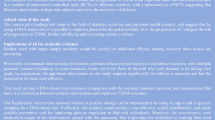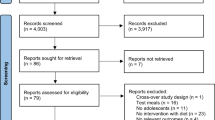Abstract
Background
Type 2 diabetes mellitus (T2DM) is one of the most common global diseases of public concern. In developing countries like Uganda, dietary habits and sedentary lifestyle are the major factors for rapidly rising incidence of DM. Therefore, awareness about diabetes dietary practices and life style are paramount in the control of the disease.
Methodology
One hundred type 2 diabetic patients were randomly selected and divided into two groups of intervention and control (50 patients in each group) to participate in the study. The intervention consisted of two educational sessions each for 30 min with various learning segments. A conversation map for type 2 diabetes, 24-h dietary recall and glycemic load tables were used. Data were collected using a pre-tested questionnaire before intervention and on monthly basis for a period of four months of intervention. Data were entered and analyzed using SPSS software version 21.
Results
There was a significant (p < 0.001) increase in water, vegetables, fruits, and number of meals intake per day coupled with quitting alcohol, soda, and beer among the intervention group. On the other hand, it was revealed that meat and milk consumption significantly reduced by 81.6 and 82.4% respectively among the intervention group. At the end of study period, milk, meat, vegetable, beer, soda, cigarettes intake, and duration of physical activity increased among the control group.
Conclusions
Nutrition education improves dietary feeding practices and lifestyle among type 2 diabetes patients within four months of intervention.
This is a preview of subscription content, access via your institution
Access options
Subscribe to this journal
Receive 12 print issues and online access
$259.00 per year
only $21.58 per issue
Buy this article
- Purchase on Springer Link
- Instant access to full article PDF
Prices may be subject to local taxes which are calculated during checkout
Similar content being viewed by others
References
Mukhtar Y, Galalain A, Yunusa U. A modern overview on diabetes mellitus: a chronic endocrine disorder. Eur J Biol. 2019;4:1–14.
Sami W, Ansari T, Butt NS, Ab Hamid MR. Effect of diet on type 2 diabetes mellitus: a review. Int J health Sci. 2017;11:65.
Curfman, G (2009). Why it’s hard to change unhealthy behavior—and why you should keep trying. Healthbeat: Harvard Health Publications.
Chawla SPS, Kaur S, Bharti A, Garg R, Kaur M, Soin D, et al. Impact of health education on knowledge, attitude, practices and glycemic control in type 2 diabetes mellitus. J Fam Med Prim care. 2019;8:261.
Zheng Y, Ley SH, Hu FB. Global aetiology and epidemiology of type 2 diabetes mellitus and its complications. Nat Rev Endocrinol. 2018;14:88.
Huang XL, Pan JH, Chen D, Chen J, Chen F, Hu TT. Efficacy of lifestyle interventions in patients with type 2 diabetes: a systematic review and meta-analysis. Eur J Intern Med. 2016;27:37–47.
Kosti, M, & Kanakari, M. Education and diabetes mellitus. Health Sci J. 2012;6.
Powers MA, Bardsley J, Cypress M, Duker P, Funnell MM, Fischl AH, et al. Diabetes self-management education and support in type 2 diabetes: a joint position statement of the American Diabetes Association, the American Association of Diabetes Educators, and the Academy of Nutrition and Dietetics. Diabetes Educator. 2017;43:40–53.
Bastiaens H, Sunaert P, Wens J, Sabbe B, Jenkins L, Nobels F, ... & Van Royen, P. Supporting diabetes self-management in primary care:pilot-study of a group-based programme focusing on diet and exercise. Primary care diabetes. 2009; 3:103-109.
Bano A, Afzal M, Sarwar H, Waqas A, Kousar S, Gulzar S. Dietary knowledge, attitude and practices of diabetes patients at services hospital Lahore. Int J Appl Sci Biotechnol. 2017;5:227–36.
World Health Organization (WHO). Practical advice on maintaining a healthy diet (2015). Accessed 9 May 2016.
American Diabetes Association (2019). Diabetes Care. Supplement 1: S46–S60.
Wolever TM, Bhaskaran K. Use of glycemic index to estimate mixed-meal glycemic response. Am J Clin Nutr. 2012;95:256–7.
Monro JA, Shaw M. Glycemic impact, glycemic glucose equivalents, glycemic index, and glycemic load: definitions, distinctions, and implications. Am J Clin Nutr 2008;87:237S–43S.
Kristo AS, Matthan NR, Lichtenstein AH. Effect of diets differing in glycemic index and glycemic load on cardiovascular risk factors: review of randomized controlled-feeding trials. Nutrients. 2013;5:1071–80.
Atkinson FS, Foster-Powell K, Brand-Miller JC. International tables of glycemic index and glycemic load values: 2008. Diabetes care. 2008;31:2281–83.
Greenwood DC, Threapleton DE, Evans CE, Cleghorn CL, Nykjaer C, Woodhead C, et al. Glycemic index, glycemic load, carbohydrates, and type 2 diabetes: systematic review and dose–response meta-analysis of prospective studies. Diabetes care. 2013;36:4166–71.
Sjöström L, Peltonen M, Jacobson P, Ahlin S, Andersson-Assarsson J, Anveden Å, et al. Association of bariatric surgery with long-term remission of type 2 diabetes and with microvascular and macrovascular complications. Jama. 2014;311:2297–304.
Peng X, Cheng KW, Ma J, Chen B, Ho CT, Lo C, et al. Cinnamon bark proanthocyanidins as reactive carbonyl scavengers to prevent the formation of advanced glycation endproducts. J Agric food Chem. 2008;56:1907–11.
Ziaee A, Afaghi A, Sarreshtehdari M. Effect of low glycemic load diet on glycated hemoglobin (HbA1c) in poorly-controlled diabetes patients. Glob J health Sci. 2012;4:211.
Amano Y, Sugiyama M, Lee JS, Kawakubo K, Mori K, Tang AC, et al. Glycemic index–based nutritional education improves blood glucose control in japanese adults: a randomized controlled trial. Diabetes Care. 2007;30:1874–76.
Elliott HL, Lloyd SM, Ford I, Meredith PA. Improving blood pressure control in patients with diabetes mellitus and high cardiovascular risk. International Journal of Hypertension, 2010;1–8.
Charlene, L, Chang, L. Drinking water may cut risk of high blood sugar. 2011. http://www.webmd.com/diabetes/news/20110630/drinking-water-may-cut-risk-of-high-blood-sugar.
Abi Haidar G, Lahham Salameh N, Afifi RA. Jarrib Baleha: a pilot nutrition intervention to increase water intake and decreased soft drink consumption among school children in Beirut. Leban Med J. 2011;103:1–10.
Esposito K, Maiorino MI, Ceriello A, Giugliano D. Prevention and control of type 2 diabetes by Mediterranean diet: a systematic review. Diabetes Res Clin Pract. 2010;89:97–102.
Yadav S, Singh A. Contribution of nutrition education in dietary habits of overweight and obese females in Hathras City (U.P.). Pakistan J Nutr. 2010;9:1047–51.
Pimentel GD, Portero-Mclellan KC, Oliveira ÉP, Spada AP, Oshiiwa M, Zemdegs JC, et al. Long-term nutrition education reduces several risk factors for type 2 diabetes mellitus in Brazilians with impaired glucose tolerance. Nutr Res. 2010;30:186–90.
Bemelmans WJ, Broer J, Hulshof KF, Siero FW, May JF, Meyboom-de Jong B. Long-term effects of nutritional group education for persons at high cardiovascular risk. Eur J Public Health. 2004;14:240–5.
Gulati T, Kochhar A, Kochhar S. Impact of nutrition education on the food and nutrient adequacy of smokers. J Hum Ecol. 2006;19:277–81.
Hunt K, McCann C, Gray CM, Mutrie N, Wyke S. “You’ve got to walk before you run”: positive evaluations of a walking program as part of a gender-sensitized, weight-management program delivered to men through professional football clubs. Health Psychol. 2013;32:57.
Valsta LM, Tapanainen H, Männistö S. Meat fats in nutrition. Meat Sci. 2005;70:525–30.
Kvist, KC. The effect of nutrition and nutrition education on alcohol cravings (Doctoral dissertation, University of Wisconsin-Stout). 2011.
Barbadoro P, Ponzio E, Pertosa ME, Aliotta F, D’Errico MM, Prospero E, et al. The effects of educational intervention on nutritional behaviour in alcohol-dependent patients. Alcohol Alcohol. 2011;46:77–9.
Klatsky AL. Alcohol, cardiovascular diseases and diabetes mellitus. Pharmacol Res. 2007;55:237–47.
Salaudeen A, Omotosho M, Tanimola A, Oladimeji B. Effects of health education on cigarette smoking habits of young adults in tertiary institutions in a northern Nigerian state. Health Science J. 2013;7:54–67.
Acknowledgements
The authors extend their heartfelt appreciation to the diabetes patients who visited Endocrine unit of Mulago hospital for their participation in this study and the staff for their support.
Author contributions
All authors equally contributed to the conception and design of the research; RM contributed to the design of the research, acquisition and analysis of the data and drafted manuscript. All authors contributed to the interpretation of data, critically revised the manuscript, agreed to be fully accountable for ensuring the integrity and accuracy of the work, and read and approved the final manuscript.
Funding
The study was funded by the Carnegie corporation of New York.
Author information
Authors and Affiliations
Corresponding author
Ethics declarations
Conflict of interest
The authors declare no competing interests.
Ethical approval
The research was approved by the Research and Ethics committee of Mulago Hospital and Institutional Review Board of Mulago hospital (Protocol MREC 113). Written and oral informed consent was obtained from all study participants.
Additional information
Publisher’s note Springer Nature remains neutral with regard to jurisdictional claims in published maps and institutional affiliations.
Supplementary information
Rights and permissions
About this article
Cite this article
Mutagwanya, R., Nyago, C.M. & Nakwagala, F.N. Effect of diabetes nutrition education on the dietary feeding practices and lifestyle of type 2 diabetic patients. Eur J Clin Nutr 76, 270–276 (2022). https://doi.org/10.1038/s41430-021-00940-3
Received:
Revised:
Accepted:
Published:
Issue Date:
DOI: https://doi.org/10.1038/s41430-021-00940-3



